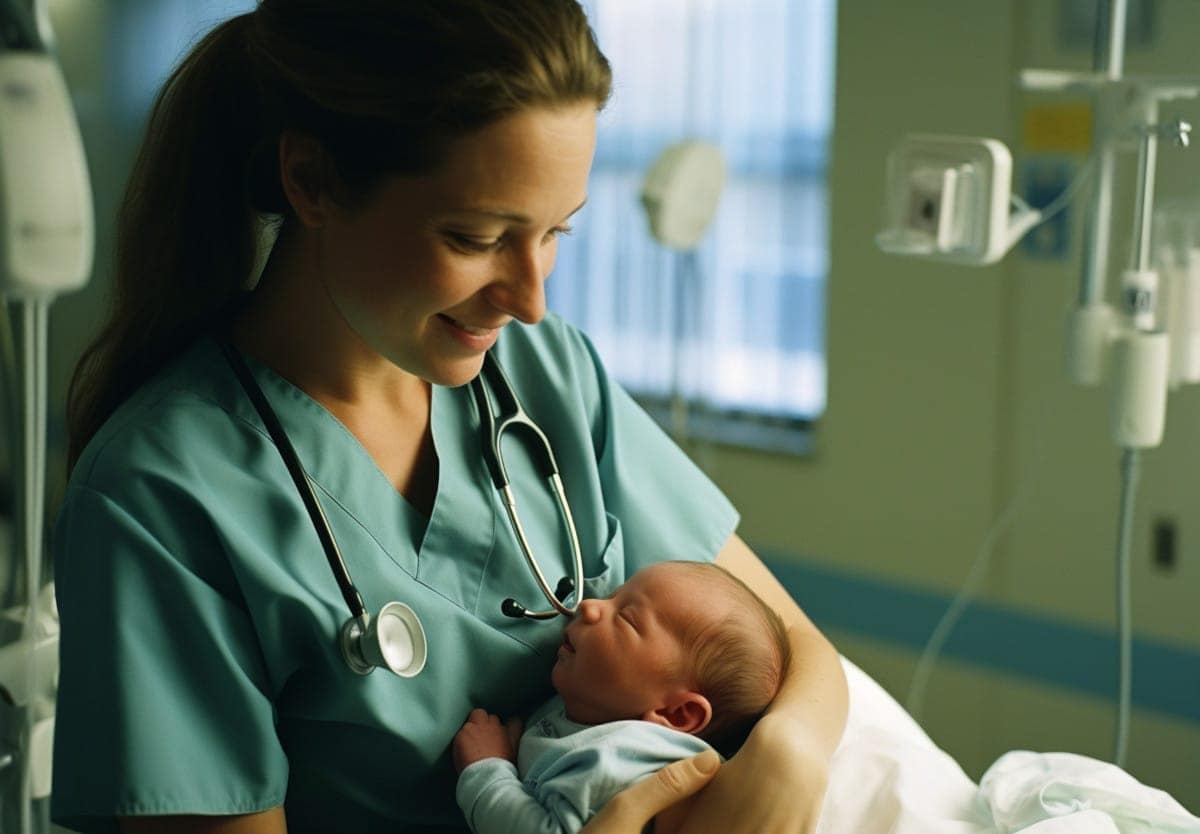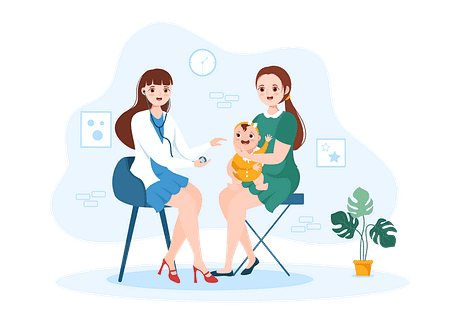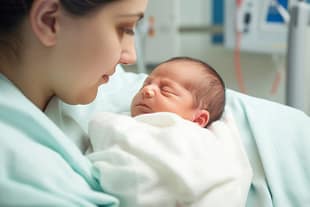
What to Expect During Your Baby’s Second Well-Child Visit (6 Weeks Old)
The second well-child visit is scheduled when your baby is around six weeks old. At this visit, your healthcare provider will closely monitor your baby’s growth and development, offer guidance on nurturing your infant, and address any concerns you may have. Here’s what to expect during this visit, broken down into key points.

28 Key Points to Expect During the Second Well-Child Visit
- Identifying Risk Factors
Your healthcare provider will begin by identifying any new or ongoing risk factors, both for the baby and parents. This helps to tailor the visit to any specific health or developmental needs. - Toy Safety
The doctor will ask you about the toys your baby is using, ensuring they are safe and age-appropriate. It’s important to avoid small parts that pose a choking hazard and to use toys made of safe materials. - Measuring Growth
The doctor will measure your baby’s weight, length, and head circumference, plotting these values on a growth chart to track your baby’s development. - Observing Parent-Infant Attachment
Your healthcare provider will observe the quality of the attachment between you and your baby. This includes noticing how responsive you are to your baby’s cues and movements. - Baby’s Response to Parent Leaving and Returning
The healthcare provider will also observe how your baby reacts when you leave and return to the room. This helps assess the baby’s emerging sense of attachment and security. - Observing Play and Interaction
The doctor will look at how you and your baby interact during spontaneous play. If you don’t engage in play, the doctor might suggest an activity. They will also observe how you talk with the baby, demonstrate affection, and comfort your baby after immunization. - Reviewing the Previous Visit’s Instructions
The healthcare provider will review the notes and instructions from the last well-child visit, making sure any follow-up actions or recommendations have been addressed. - Reviewing the Checklist
The office staff may have completed a checklist outlining specific areas of concern for your baby. The doctor will review this to focus the examination on important health aspects. - Reviewing Neonatal Screening Results
If the neonatal screening results were not reviewed during the first visit, they will be checked now. If the screening wasn’t done, the doctor will order it. - Addressing Parental Health Concerns
The doctor will ask, “Do you have any health concerns about your baby?” This is your opportunity to bring up any issues, whether they relate to feeding, sleeping, or general behavior. - Urine and Stool Patterns
Your baby’s urine and stool patterns are important indicators of their health. The doctor will ask about frequency and consistency to ensure your baby is digesting well and staying hydrated. - Breastfeeding Concerns
If you have concerns about breastfeeding, the doctor will explore details such as latch, frequency, and any issues with breast or nipple pain. - Vitamin D Prophylaxis
The doctor will check to ensure your baby is receiving vitamin D supplements, which are crucial for bone health. - Parent Confidence in Handling the Baby
You’ll be asked how confident you feel about handling and interacting with your baby. If needed, the healthcare provider can offer tips on bonding, soothing, and caring for your infant. - Play and Communication
The doctor will ask, “How do both of you play with your baby?” and “How do both of you talk with your baby?” This helps assess your baby’s cognitive and social development and offers a chance to discuss ways to engage your baby with toys and communication. - IAP Parent Stress Questionnaire (IAP-PSQ-4)
At the end of the visit, parents may be asked to fill out the IAP Parent Stress Questionnaire. This helps assess how you are coping with the demands of parenting and allows the healthcare provider to offer appropriate support. - Interpreting the Growth Chart
The doctor will interpret your baby’s updated growth chart, making sure that your baby is following their growth curve. - General Physical Examination
A thorough physical examination will be conducted, checking for jaundice, skin conditions, umbilical healing, and any birth defects. - Systemic Examination
In addition to the physical check-up, the doctor will examine major systems such as the heart, lungs, and digestive system to ensure they are functioning well. - Vision Check
The healthcare provider will check for ocular abnormalities and assess your baby’s ability to follow objects with their eyes. If the first hearing test (OAE) results were abnormal, further tests like ABR will be ordered and may require a specialist consult. - Breastfeeding Pain Assessment
If breastfeeding is painful, the doctor will assess the baby’s attachment and positioning and check for any breast or nipple issues. - Monitoring for Neglect or Postpartum Depression
The doctor will look for signs of neglect or maternal postpartum depression, which can negatively affect both the baby’s and mother’s well-being. - Administering Immunizations
As per the immunization schedule, your baby will receive the recommended vaccines. The healthcare provider will also explain the benefits of immunization and what to expect afterward. - Exclusive Breastfeeding (EBF) Counseling
The doctor will reinforce the importance of exclusive breastfeeding (EBF), discussing the benefits for the baby and mother and explaining the potential consequences of not breastfeeding exclusively. - Developmental Stimulation
Based on the MCP card, the healthcare provider will suggest age-appropriate developmental stimulation activities. These are important for your baby’s sensory and motor development. - Anticipatory Guidance for Sensory Development
Parents will be encouraged to engage their baby’s senses. Suggestions include:
- Sight: Provide ways for your baby to see bright colors, patterns, and moving objects.
- Hearing: Talk, sing, and play soft music for your baby.
- Touch: Give gentle strokes, massages, and provide supervised tummy time.
- Recognizing and Responding to Cues
Parents will be advised to recognize and appropriately respond to their baby’s cues. This includes feeding when the baby is hungry, soothing when crying, and calming when overstimulated. - Preventive Health Care Tips
The healthcare provider will discuss the importance of personal hygiene, such as skin care, and other preventive measures to ensure the baby stays healthy.
The second well-child visit is an important milestone in your baby’s early development. It helps ensure your baby is growing well, addresses any concerns you may have, and provides guidance on nurturing your baby’s emotional and physical development. Be sure to engage in the process, ask questions, and take advantage of the valuable support and advice offered by your healthcare provider.










































